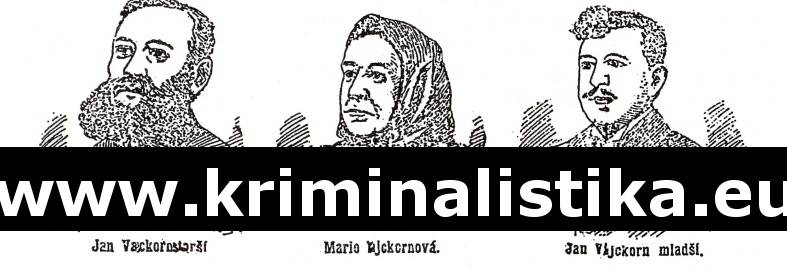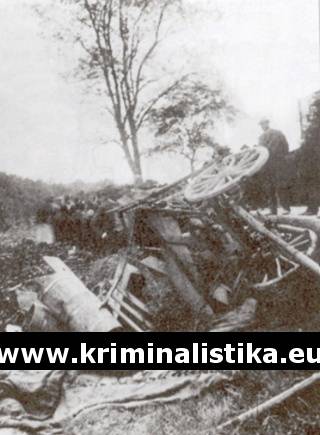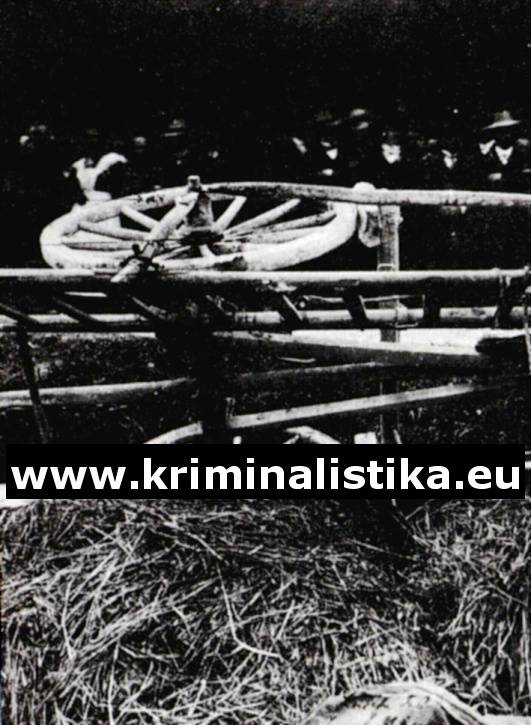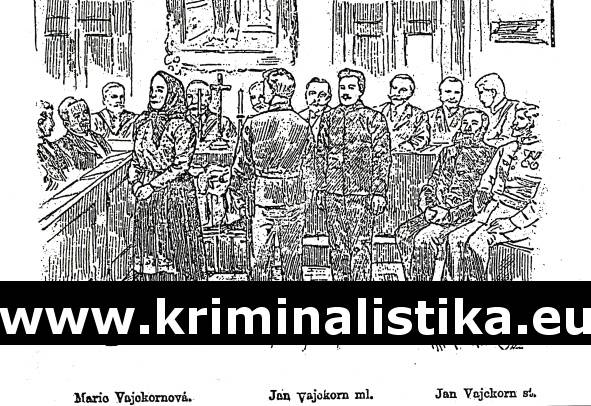A Murdering Family
A fourfold murder - life imprisonment, 1907

A murdering family is rare to be found in the criminalistic files. A father, a son and a mother cooperate on a fourfold robbery with violence. Two couples are their victims. Eight children become orphans at one go. Thinking about it today, you may find interesting that it was a way of "cleaning up due bills" even a hundred years ago…
In the early Friday morning of July 5th, 1907, a gamekeeper Ambros finds an overturned carriage by the road. It is a twenty-minute walk from Křtiny (a village within the Brno region) to Jedovnice. The carriage beam is broken. There is a horse grazing nearby. Ambros comes closer and he can see four dead bodies. One of the dead bodies is cover with some straw. He runs back to the village to report the murder at the local gendarmery. He meets several people on his way there and tells them what he has found.
The crime scene

Lots of local people gather at the scene of crime. Mr. Liebiger, a local practitioner, views the dead bodies. His result? It was not an accident, they have been murdered. Their faces have been smashed with a sharp instrument, probably with an axe. A horsewhip, two wooden cases, a piano accordion, a stick, a suitcase and three pieces of canvas luggage are found scattered round the carriage. Twenty kilograms of tallow, transported in that carriage, are missing. The tallow is found in the local pond by a young man later.
The gendarmerie commander takes the carriage and leaves for Brno to advise the examining body of the murder. Coming back at the crime scene ten hours later, they find crowds of people from Křtiny, Jedovnice, Habrůvka, Bukovina, Kanice, Rudice or Ostrov there. Some footprints are found in the local field and thus it is obvious there were at least two murderers. The murderers are sure to be hiding in the field waiting for their victims. The unbuttoned clothes and pockets turned inside out prove that the victims were searched through.
The overturned carriage

The victims are identified during the police investigations at the scene of crime: Josef Němec and his wife, Amálie, form Ostrov near Macocha and the Hrazdírs from Krasová (the former Blansko region). They were coming back from Brno. There was a fair and they were selling butter, fruit and vegetable there. The baker Kupka wants Josef Němec to withdraw 700 korunas from the First Moravian Bank of Deposit. But there is no money found at the crime scene.
A four-member nomadic group from Dalmatia with their monkeys was seen near the scene of crime. They are found and policed, but they are not proved to have something in common with the murder. Nevetheless, their names are recorded. Other two gendarmerie drop in seven pubs in Křtiny and they learn that a Jan Vajckorn (22) from Ostrov was in two pubs in Křtiny at about 11 o'clock the previous night. He bought a bottle of firewater there and he took it away. He and his father are known to be a kind of local rowdies.
All the members of the Vajckorn family, including the mother, were on trial several times. An axe laid to a chock is found during the house search in the backyard of Vajckorn. Although it was washed thoroughly, some blood is found on it. The young Jan Vajckorn lives in a single-room house together with his parents. There are 135 korunas found hidden behind a picture on the wall. There are some blood stains found on his mother's (48) clothes. The blood stains are found on Jan Vajckorn's hat too. They have never had any saving book but there is one found in their stove. Both of them are arrested that day.
Jan Vajckorn's father (49) is arrested in the pub in Jedovnice the same day as well. He goes to pub shortly after returning from the scene of crime. He goes there together with his neighbours from Ostrov. He is the suspected at that time. His bloodily clothes are found not far from the village called Rudka.
The Vajckorns on trial

The Viennese experts prove the blood to be of a human origin. As the blood groups are still unknown, the match of blood samples of the murdered and the blood samples found on the clothes of the suspected cannot be proved.
The gendarmerie manage to find sixteen witnesses who prove the Vajckorns having been not far from the crime scene that night. Father and Mother deny their participation. The young Vajckorn is the only who pleads guilty. The police investigations show that the Vajckorns used to have a shop in Ostrov, but they went bankrupt. They blame on Josef Němec, "the competitive trader". They realy do hate him. He has been threatened with death several times.
The trial begins on November 13th, 1907 in Brno - Cejl, the Municipal Law Court building and it lasts three days. A 1680-page prosecution accusing Jan Vajckorn senior, Jan Vajckorn junior and Marie Vajckornová of a fourfold murder is brought to the court. The sentence is passed on Friday, November 15th, 1907 at 8:00 p. m. – the death sentence for all the three accused. They are to be hanged. However, they have never been hanged. They die a natural death in prison. Jan Vajckorn junior dies of tuberculosis in May 1911, Jan Vajckorn senior dies in July 1920. Both of them die in Plzeň-Bory Prison. Marie Vajckornová dies in August 1916, in Řepy near Prague, in the women's prison.
© Miloslav Jedlička, D. C. L.Translated by inspector WO Pavel Vršovský, M. A.